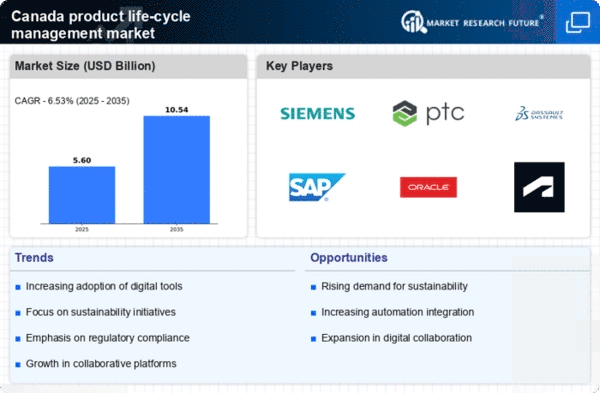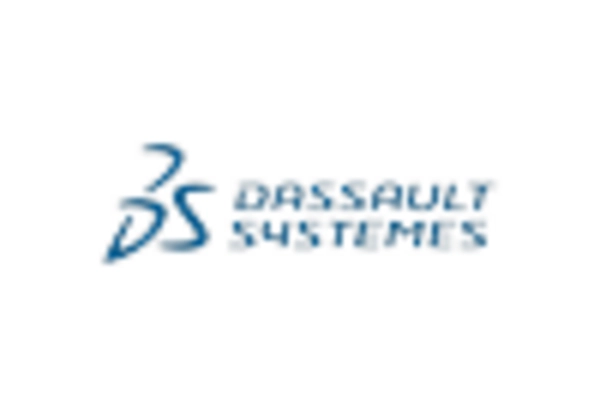Regulatory Compliance and Standards
The product life-cycle-management market is significantly influenced by the evolving regulatory landscape in Canada. Companies are increasingly required to comply with stringent regulations regarding product safety, environmental impact, and quality standards. This compliance necessitates the adoption of robust product life-cycle-management systems that can ensure adherence to these regulations. In 2025, it is projected that approximately 30% of Canadian firms will prioritize compliance-related features in their product life-cycle-management solutions. This focus on regulatory compliance not only mitigates risks but also enhances brand reputation, making it a critical driver for the market.
Technological Advancements in Data Analytics
Technological advancements in data analytics are reshaping the product life-cycle-management market in Canada. The integration of advanced analytics tools allows companies to gain deeper insights into product performance and customer preferences. By leveraging big data, organizations can make informed decisions that enhance product development and marketing strategies. In 2025, it is anticipated that firms utilizing data analytics within their product life-cycle-management processes could improve their market responsiveness by up to 25%. This capability to analyze and act on data trends is becoming increasingly vital for maintaining competitiveness in a rapidly evolving market.
Increased Investment in Digital Transformation
The product life-cycle-management market is benefiting from increased investment in digital transformation initiatives across various sectors in Canada. Companies are recognizing the need to modernize their operations to remain competitive in a digital-first environment. This transformation often involves the adoption of advanced product life-cycle-management systems that integrate seamlessly with other digital tools. In 2025, it is projected that Canadian businesses will allocate approximately 15% of their IT budgets to product life-cycle-management solutions. This investment is likely to enhance operational efficiency and improve customer engagement, positioning companies for long-term success in the market.
Rising Demand for Efficient Resource Management
The product life-cycle-management market in Canada is experiencing a notable increase in demand for efficient resource management. Companies are increasingly recognizing the importance of optimizing their resources throughout the product life cycle. This trend is driven by the need to reduce waste and enhance productivity. In 2025, it is estimated that organizations focusing on resource efficiency could see a reduction in operational costs by up to 20%. This shift towards sustainability not only aligns with environmental goals but also improves profitability. As a result, businesses are investing in product life-cycle-management solutions that facilitate better tracking and management of resources, thereby enhancing their competitive edge in the market.
Growing Emphasis on Collaborative Product Development
The product life-cycle-management market is witnessing a growing emphasis on collaborative product development among Canadian companies. As businesses strive to innovate and bring products to market faster, collaboration across departments and with external partners becomes essential. This trend is fostering the adoption of integrated product life-cycle-management solutions that facilitate communication and collaboration. In 2025, it is expected that around 40% of organizations will implement collaborative tools within their product life-cycle-management frameworks. This shift not only accelerates the development process but also enhances the quality of the final product, thereby driving market growth.
















